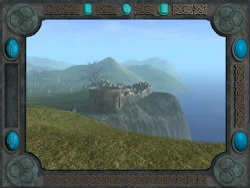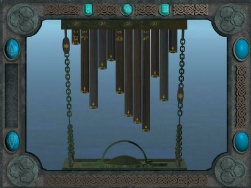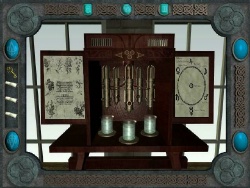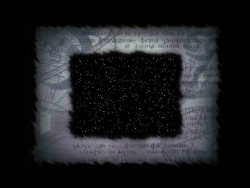|
Celtica (Second Opinion)
 Why
is there air? To blow up basketballs with, naturally. Why
is there air? To blow up basketballs with, naturally.
Here's another theory for you, perhaps more relevant: that every once and a while... a game gets
sucked into a vortex formed by the collective nightmares of all the world's computer gamers, and
subsequently, many years later (probably when the planets are aligned 'correctly') manages to be
spewed out, only to mysteriously appear on the shelves in your local store. Celtica could be one
of these games. If only it had been released in 1992 when it was obviously meant to be, things
might have been different... but they're not. This is Myst all over again. Although to give credit
where it's due, some of the puzzle ideas were ripped off from Zork Nemesis instead.
 Being
a denizen of the fabled Emerald Isle myself, I had high hopes that Celtica would somehow do the place
justice. But alas, it was merely used as the setting in which to plonk down 24 puzzles. When the
official blurb for the game tells you exactly how many puzzles are contained therein, I start to
break out in a cold sweat. Why not just give us the puzzles and be done with it? Nope. Gotta have...
a hand-written diary. Check. Does the diary have a clue in it? Probably, but I couldn't find one even
after meticulously poring over all it's 20-odd hard-to-read pages. Check. I knew I was going to find
the diary pretty early on, because one of the first things I got as a reward for solving a puzzle was
Bernadette's Diary Key. All the objects in your inventory have very descriptive labels, so you always
know exactly where they are to be used. I wish the same applied to some of those real life keys I've
been carrying around for years now, having no idea what lock they might open! Being
a denizen of the fabled Emerald Isle myself, I had high hopes that Celtica would somehow do the place
justice. But alas, it was merely used as the setting in which to plonk down 24 puzzles. When the
official blurb for the game tells you exactly how many puzzles are contained therein, I start to
break out in a cold sweat. Why not just give us the puzzles and be done with it? Nope. Gotta have...
a hand-written diary. Check. Does the diary have a clue in it? Probably, but I couldn't find one even
after meticulously poring over all it's 20-odd hard-to-read pages. Check. I knew I was going to find
the diary pretty early on, because one of the first things I got as a reward for solving a puzzle was
Bernadette's Diary Key. All the objects in your inventory have very descriptive labels, so you always
know exactly where they are to be used. I wish the same applied to some of those real life keys I've
been carrying around for years now, having no idea what lock they might open!
 You can't be in contention for the 'Myst Wannabe of the Year 199x' without: cryptic little notes that
don't really tell you anything scattered all around the place. They provide the 'suspense'. Check.
Story? You only find out little bits at a time by reading other slightly more informative pieces of
paper (check), such as those left behind by a U-boat captain. He's also abandoned an Enigma-like code
machine. Of course, there are lots of neat looking mechanical artifacts like this left around the
place that you can look at and sometimes operate, but they aren't puzzles. Check.
You can't be in contention for the 'Myst Wannabe of the Year 199x' without: cryptic little notes that
don't really tell you anything scattered all around the place. They provide the 'suspense'. Check.
Story? You only find out little bits at a time by reading other slightly more informative pieces of
paper (check), such as those left behind by a U-boat captain. He's also abandoned an Enigma-like code
machine. Of course, there are lots of neat looking mechanical artifacts like this left around the
place that you can look at and sometimes operate, but they aren't puzzles. Check.
After solving each series of puzzles, some of which cough up magical harp strings, another which
yields an amulet that you really didn't know you were looking for until you read the game blurb on
the web site after the fact... you get transported to the next section of the game through 'portals'
(that are extremely reminiscent of Stonehenge). This happens to you 3 or 4 times. Check. Your progress
through the game is noted via a nice looking overlay that pops up after you solve each puzzle,
accompanied by the sound of talented little fingers running across harp strings - of course - and
another one of the 24 'progress gems' lights up. Great! Only 19 more puzzles left then. Groan. You
must wander through many empty frames to find the infrequent puzzles, and the even more infrequent
clues. Check.
 At
least Myst had a few people that talked to you, even if it was non-interactive drivel. Here, there's
nobody to talk to. Just acres of grassy knolls, stone towers (that are all virtually the same inside.
Saved some production costs there, Artech , but I noticed), nothing at all moving except the puzzles
when you zoom in to solve them. Dare I say... slide show? Oops. Check... and mate. At
least Myst had a few people that talked to you, even if it was non-interactive drivel. Here, there's
nobody to talk to. Just acres of grassy knolls, stone towers (that are all virtually the same inside.
Saved some production costs there, Artech , but I noticed), nothing at all moving except the puzzles
when you zoom in to solve them. Dare I say... slide show? Oops. Check... and mate.
Copyright © Steve Metzler 1998.
All rights reserved.
System Requirements:
Windows 95, P100, 16MB RAM, 2MB hard drive space, keyboard, mouse
|
